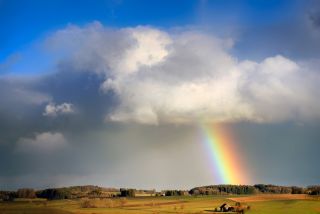Positive Psychology
How Awe Helps Us During Difficult Times
Everyday wonder is a pathway to feel emotionally and physically healthier.
Posted October 4, 2023 Reviewed by Lybi Ma
Key points
- Awe inspiring experiences can be felt in simple moments of everyday life.
- Awe is considered a positive emotion, like others such as love, joy, amusement, interest, and gratitude.
- During good times and bad, there are many ways to experience awe.
How can we come face-to-face with life, opening to what is? Humans have a fundamental capacity for growth—our transformative potential is a variable process, not a motionless state of being. Recent research shows that daily experiences of awe can increase our well-being and predict greater satisfaction with life. Awe has been associated with reducing stress and physical health symptoms, such as lowering inflammation (Monroy, et al, 2023).
Many of us know the word awe but aren’t exactly sure what it means. Awe is about relating to experiences that are somehow larger than ourselves. Awe can be experienced in simple moments of everyday life, such as noticing the beauty of cloud formations in the sky. We may experience awe when we listen to the melodic tones of a violin, a singer’s harmonious voice, or when we chant uplifting words or melodies. Awe may be awakened in the presence of another person as we discuss a compelling or destabilizing topic. We may experience awe in a moment of tenderness with someone or something we love. Sometimes awe is inspired as we notice a person’s kindness, gentleness, or generosity.

A few years ago, my friend and I were driving home from her family reunion when we were confronted by an unwelcome, potentially dangerous thunderstorm. As the horizon began to clear, we looked up to see the largest rainbow we’d ever seen, extending for what seemed like miles and reaching high from the sky to the ground. We pulled over and gazed with wonder at this miracle, exclaiming with joy and gratitude. In those moments, we each felt connected to something much larger than ourselves.
According to Dacher Keltner, Ph.D., a researcher in the science of human emotion, we can discover awe anywhere in our lives. “Awe is the emotion we experience when we encounter mysteries we don’t understand” (Keltner, 2023). There is a sense of “vastness” in awe that transcends our current connections and understandings. The content of what provokes the awareness of vastness or mystery varies greatly across location, culture, and life context—your perception of what arouses awe may be very different than mine.
The experience of awe is considered a positive emotion by psychologists, along with other emotions, such as love, joy, amusement, interest, and gratitude (Monroy & Keltner, 2023; Fredrickson, 2013). A recent study reviewing scientific findings on awe by Maria Monroy and Dacher Keltner explains that awe involves five key human processes (2023):
- Shifts in neurophysiology. Awe-related processes are associated with changes, including reduced arousal from stress, reduced anxiety, reduced inflammation, and elevated vagal tone (which can help the body relax faster after stress, improve digestion, and have many other benefits).
- Reduced focus on the self can happen during awe-inspiring encounters, for example, during encounters with nature or other experiences.
- Relating to others more cooperatively. Experiences of awe are associated with greater preference and actions toward collaboration, cooperation, helping, sharing, and generosity, which can benefit other people or society as a whole.
- Greater social integration. Awe can inspire closer social distances between individuals and groups, a greater community with others, and with social networks.
- Greater sense of meaning or purpose. Experiences of awe can energize people to seek greater meaning and meaning-making processes in their own lives and their world. For example: understanding how events and experiences fit together, looking at connections between ourselves and that which is larger than ourselves, engaging in reflection and action that somehow make a difference in the context of our values.
In conclusion, during good times and bad, there are many pathways to experience awe. The philosopher and theologian Abraham Joshua Heschel (1983), is credited with this famous quote: “Our goal should be to live life in radical amazement…. get up in the morning and look at the world in a way that takes nothing for granted. Everything is phenomenal; everything is incredible; never treat life casually. To be spiritual is to be amazed.”
Even during these challenging times, you might consider the possibility that awe-inspiring experiences can be discovered in everyday amazement and wonder. How can you invite awe into your daily life?
Disclaimer: This post is for informational purposes only. No content is a substitute for consulting with a qualified mental health or healthcare professional.
© 2023 Ilene Berns-Zare, LLC, All Rights Reserved.
References
Heschel, A. J. (1983). Dr. Heschel refers to radical amazement in many sources including: God in search of man: A philosophy of Judaism. New York, NY: Farrar, Straus and Giroux; This quote is cited in sources including: Pereira, C. (2016). On Science & Phenomenology in Consciousness Studies. Journal of Consciousness Exploration & Research, 7 (3), 269-273; Mescher, M. (2018). Jesuit Higher Education: A Journal.
Keltner, D. (2023). Awe: the new science of everyday wonder and how it can transform your life. New York, NY: Penguin Press.
Monroy, M., & Keltner, D. (2023). Awe as a pathway to mental and physical health. Perspectives on Psychological Science, 18(2), 309-320.
Monroy, M., Uğurlu, Ö., Zerwas, F., Corona, R., Keltner, D., Eagle, J., & Amster, M. (2023). The influences of daily experiences of awe on stress, somatic health, and well-being: a longitudinal study during COVID-19. Scientific Reports, 13(1), 9336.


